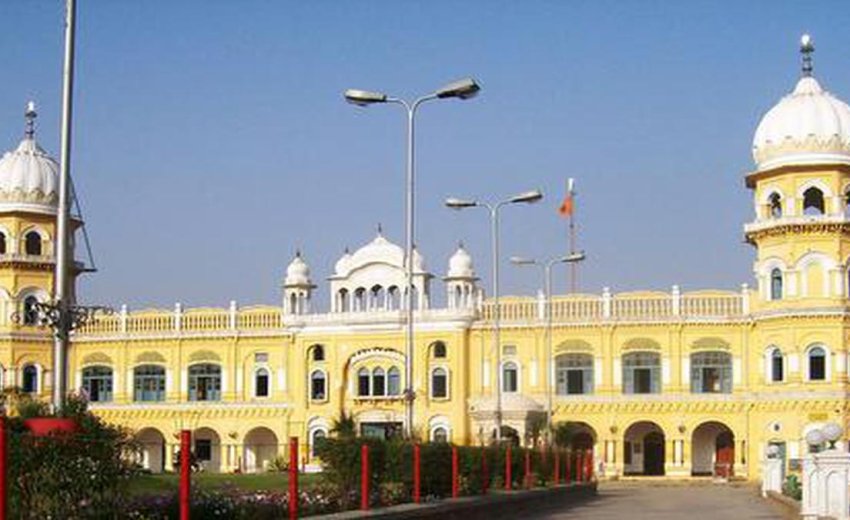Nankana holds a significant place in the hearts of Sikhs
Nankana holds a significant place in the hearts of Sikhs, much like Makkah does for Muslims. It's the birthplace of their revered prophet, Baba Guru Nanak. This town, nestled in the Rachna Doab region, is adorned with remnants of Sikhism, echoing Baba Nanak's early life. These remnants have evolved into revered sites of worship and pilgrimage.
In his youth, Nanak's father entrusted him with 20 rupees to start a business. Instead of pursuing personal gain, Nanak chose to alleviate the suffering of the needy by donating the money. To evade his father's disapproval, he sought refuge under a cluster of vann bushes, which later transformed into Gurudwara Tamboo Sahab. In Punjabi, "Tamboo" signifies a protective roof-like structure, symbolizing the shelter Nanak found amidst adversity.
In an article published in dawn.com, the writer shares the experience of living in Nankana for a few days in the year 2013. The author stayed for some nights with a friend, Kalyan Singh who was a lecturer of Punjabi at the Government College, Gujranwala. Punjabi is very important to Sikhs because it is the language of their holy book, the Guru Granth Sahab. However, in this community of over 200 Sikh families, Pashto is the main language spoken. Most of them came here from tribal areas and Pakhtunkhwa.for these families,Nankana Sahab is their last hope. They are trying to take refuge under this tamboo of which barely a piece is left.
After spending time with them, the author noticed something interesting: their way of talking about time was completely different from what most people are used to. This is actually quite sad when you think about it. For example, if you ask one of them to tell you about their life, it might sound like this: “After the 1971 Indo-Pak war, my sister’s family migrated from Peshawar, at the demolishing of the Babri mosque in 1992, many of the brothers also quit and my parents finally moved out after the 9/11.”
Unfortunately, there are still more new time markers of a similar nature. Here, he encountered Sher Singh, who moved from Dera Bugti about five years ago due to the violent conflict that made survival there impossible.
Problems faced by the community
Living in the shadow of Gurudwaras' walls, this small community faces serious problems. While Gurudwaras hold sacred significance for Sikhs, many Muslims in Nankana view them as valuable real estate. As a result, businesses and homes have been established on this land, with occupants exploiting religious tensions for their own gain.
Unfortunately, politicians have avoided addressing this issue. The Sikh population is small, and the community feels too insecure to engage in political matters. Additionally, their lack of proper identification cards further marginalizes them, making them feel excluded from the political process.
Legal complications arise from their migration from tribal areas, and they often lack the same status as those in fully settled regions. Obtaining basic services, such as securing a B form for their children's citizenship, becomes an arduous task due to bureaucratic caution. Officers fear repercussions from intelligence agencies and find it simpler to dismiss non-Muslims rather than confront potential risks.
When the author met Kalyan Singh at Punjab University, he noticed bruises on Singh's hands and face. Singh, who is pursuing his doctorate, explained that earlier that day, he was shoved and pushed to the ground by a stranger for no reason while in a government office. With a grim expression, he mentioned that such incidents happen frequently, where people misbehave with them in public just for fun. He also expressed concern that some might do it believing they will be rewarded for it.
In the bustling market where local Sikhs often gather, many of the food joints either outright refuse to serve them or provide separate cups and glasses. Kalyan Singh, who has lived here for a long time, can easily point out which street vendor will serve him and which won’t. One of the major challenges they face is proving their citizenship. Sometimes, they struggle to obtain the necessary documents. For instance, there have been cases where a child couldn't even sit for their school exams because they didn't have a required B form.
Many Sikh children attend a school created by their community, which also welcomes children from other faiths. This school is led by a Muslim educator and staffed by Muslim teachers. All students, regardless of their faith, learn about Islamiyat since there are no other options in the government's curriculum.
The author's story wouldn't be complete without sharing a piece of the past he found at the foot rest of Gurudwara Tamboo Sahab. It's a subtle hint of what things were like in the good old days. A person who identified himself as a dervish, paying homage to Baba Guru Nanak, and refused to distinguish based on religious beliefs, saying, “He was an Allah-wala of a very high stature. That’s all I know,”
Dervish’s words mark the true essence of any religion. It highlights how the supreme power reigns above all, and religion is just a means to show reverence to the holy power.
*Based on an article published in dawn.com on 29th April 2013
